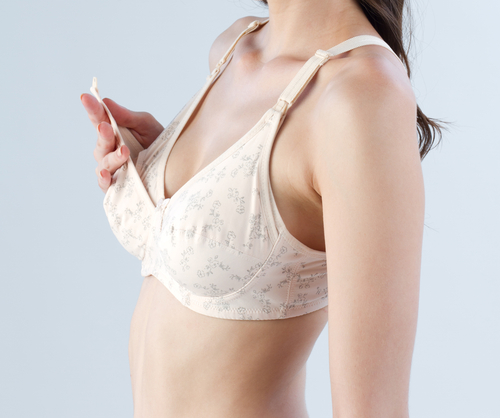 If you have a milk on breast, but you are not pregnant you may be scared and confused. Often, discharge from a nipple is nothing to worry about. Sometimes leaking breast but not pregnant can be serious, but it is most often normal. If you are still concerned, you are not nursing a baby and have nipple discharge, you should contact your doctor so that tests may be run.
If you have a milk on breast, but you are not pregnant you may be scared and confused. Often, discharge from a nipple is nothing to worry about. Sometimes leaking breast but not pregnant can be serious, but it is most often normal. If you are still concerned, you are not nursing a baby and have nipple discharge, you should contact your doctor so that tests may be run.
I'm Not Pregnant, But Why Is My Breast Leaking?
Galactorrhea is a condition where a non-pregnant, non-breastfeeding woman leaks from one or both breasts. This is actually discharge that can be green or yellow in color. It happens to women who have been pregnant in the past, although can happen to anyone. It is sometimes milk production caused by squeezing the nipples, sexual arousal or clothing rubbing. Other causes include:
- Hormonal medications or psychotropic drugs
- Herbs (Anise, Fennel)
- Illegal drug use (marijuana)
- Tumors in the Pituitary gland
- Hypothyroidism
Checking repeatedly for leakage by squeezing the nipples can also stimulate more discharge. Women who are overly worried may touch their breasts too often and make the problem worse. If you have a leaking breast, try not to touch it too much and this may help things clear up.
What Should I Do?
The first thing to do is to stop any form of stimulation to the breasts. Refrain from touching the nipple area, squeezing, tight clothing and sexual stimulation of the breasts. If those things do not work, you can talk to your doctor about omitting any medications or making medication changes if this is the cause. You can also try dietary changes and exercise changes.
You may not need to worry about breast cancer, but you may have something going on that needs a doctor’s attention. Wait one menstrual cycle and if the issue does not clear up, give your doctor a call. After you’re no longer having periods, you need to contact your doctor as soon as possible.
When to Worry About Leaking Breast But Not Pregnant
Only your doctor can tell you if what you are experiencing is normal or not based on testing.
- One cause for concern is when the discharge from the nipple is bloody. This is not a normal sign.
- When discharge only happens on one side or comes on suddenly without nipple stimulation, it is also cause for concern.
- Nipple discharge cannot be judged by color. When discharge is normal or not, in both cases discharge can range from yellow, green, white or clear.
What Are the Causes of Abnormal Nipple Discharge?
The causes for a leaking breast but not pregnant vary from mild to serious, below are the detailed explanation:
1. Minor Causes
- Hormonal Changes. Hormonal changes during puberty, after pregnancy and during menopause may cause leaking milk on breast. Thyroid hormone changes or Cushing’s disease can also cause milk production and breast leakage.
- Contraceptive Use. The pill can cause the nipples to leak due to the hormones in the medication. This is usually just temporary and can also cause breast enlargement and soreness.
- Recent History of Breastfeeding. It is possible for your body to make milk as long as two years after your baby is weaned.
- Blocked Milk Duct. If you choose not to breastfeed after the birth of a baby, the lack of milk flow from the nipple can cause blockage in a milk duct. This may cause mild leakage from the breast until the milk dries up.
- SSRI Antidepressants. These medications increase prolactin in the body. This is the hormone that causes the body to produce milk.
- Nipple Stimulation. Handling of the nipples during a breast exam or sex can cause them to leak.
2. More Serious Causes
|
Causes |
Description |
|
Fibrocystic Breast Changes |
Fibrocystic breast changes are changes within the breast tissue that is made up of fibrous tissue. This can feel like a lump, causing some pain and itchiness. Another symptom of this is discharge from the nipple that is green, yellow, white or clear. The lumps from the fibrous tissue does not mean you have breast cancer, but it is always good to get checked by your doctor. |
|
Infection (Mastitis) |
Infection may be present if the discharge is foul smelling or looks more like pus. A breast infection is called mastitis and usually happens in breastfeeding women. Non-breastfeeding women can get mastitis too. Symptoms include swelling, warmth, redness and pain in the breast. |
|
Mammary Duct Ectasia |
Mammary duct ectasia is another very common symptom in women near menopause. This condition causes breast discharge due to duct blockage and inflammation near the nipple. The discharge is usually thick and green. |
|
Intraductal Papilloma |
These are benign growths that occur near the milk ducts. They are one of the largest causes of discharge from the breasts. They can become inflamed and cause bloody or sticky discharge. |
|
Abscess
|
Discharge of milk on breast that contains large amounts of pus is most likely an abscess near the nipple area. When an abscess happens, pus forms in a pocket usually from bacteria. This causes a large painful red and swollen lump in the area. These can form after a case of mastitis and may need further antibiotic treatment or even surgical drainage. If you are on a course of antibiotics and develop an abscess, contact your doctor. You may need to be referred to a specialist for further treatment. |

